|
"Big" (Lau), a body-builder and a stripper from the Chinese Mainland, working illegally in Hong Kong, is chased by the police after a search in a night club where he performed for an audience of exhilarating women. Another police operation is chasing a murder suspect, whose flexibility and abilities in martial arts defy some laws of physics. The two law enforcement agents' teams and the two suspects meet in the night.
"Big" (1) is a former Buddhist monk who devoted himself to bodybuilding and strip-shows after leaving the spiritual life, achieving the ability to see karma following an emotional shock in his past. When he meets Lee Fung-yee (Cheung) he first turns away his look, refusing to see what must surely be the fate from which she cannot run from, but eventually tries to help her. Lee seems destined to pay for the atrocities she committed in her previous incarnation — a Japanese soldier.
昨日的因結成今日的果
Yesterday's actions make today's outcomes.
The promotional poster of Running on Karma says something like “we take nothing from this life but our own actions”. This is the principle of karma, which one may translate simply for “we reap what we sow" (2), the difference being that what is underlying here is Life itself as a more vast and continuous process, i.e., each life is just a stage where each one of us evolves, step by step, in the defining of our spiritual being or soul.
As much as one may choose to treat these concepts as something rather “exotic” or “new age”, these should be perfectly understood by any western not bound by this terminology. In a way, we may adjust these Buddhist principles to the Christian morality more familiar to our European civilization — inevitability instead of Hell's threat at the end of our lives as a reason for submission to a religious cult and its moral rules.
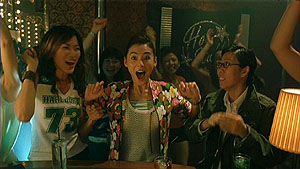 |
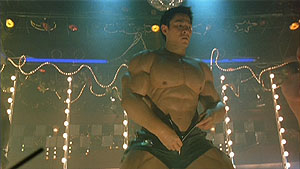 |
A group of young women are delighted by the over muscled “Big”'s performance, but… |
Hong Kong cinema was never renowned for refined and long shooting schedules. The star in this To and Wai film is in fact known for multiplying himself in different production sets, even listing 14 entries in his filmography in a single year during the local cinema's golden age.
At the source of Running on Karma was another film for the masses set on the “marketing” factor of having Andy Lau inside a rubber costume. It wouldn't be a first for Lau, who had already acted with Sammi Cheung Say-man in Love on a Diet (2001), a light romantic comedy, also directed by To and Wai, about a XXL couple, where the actors had to work inside latex suits that enveloped their whole bodies. As the team, led by Wai Ka-fai (3), developed the script, the project became more ambitious and the text more complex and intricate. The final result is a film one can place among the directors' more personal works but that still was able to win over Hong Kong audiences becoming a box office hit.
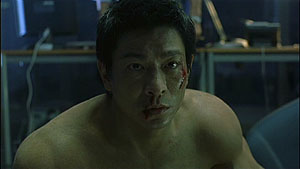 |
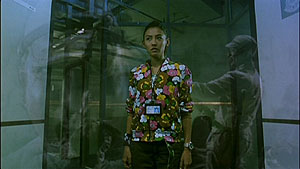 |
"Big" (Andy Lau) sees Fung-yee's (Cecilia Cheung) karma. Horrible deeds from a previous life hover around her. |
Running on Karma crosses a great variety of film genres. If we wished to put a label, segment by segment, we would say that the beginning resembles a conventional police investigation film, then turning into a mystery and fantasy thriller, with a little bit of martial arts on the side and a language closer to horror, following a moment of pure super-hero comics and only then, from the middle of the film onward, dedicating itself to its main subject — the inevitability of karma.
In its first half, where the various genres collide and merge, to make reference to To's former work we are not that far from Dung Fong Saam Hap/Heroic Trio (1993), at least regarding the mise en scène and visuals, for we can not find here any of that silly sense of humour that partly describes one of the essential titles in the director's career.
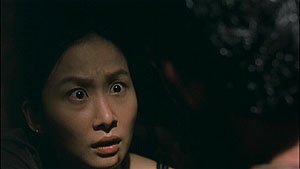 |
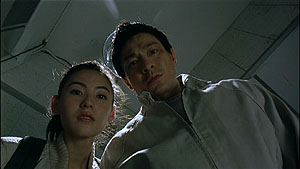 |
Behind the horrific, karma brings two strangers closer. "Big" helps Fung-yee investigate a strange case. |
As fate seems to resist even to the intervention of a visionary ex-monk with super-human abilities, the tone in Running on Karma becomes growingly dark reaching an end where we find an unwavering consistency without concessions. Balanced, with a transparent logic, inevitable as karma itself. It would not have been difficult to end the film in a lighter way, leaving us at the same time a moral lesson, but Wai and To manage to keep, in just ninety minutes, the rhythm and the energy always in the red, and the end, although dark as it may be, manages to give us some comforting reassurance.
The film's conclusion has turned out to be somewhat confusing to some, mainly due to a sequence that can not be interpreted as “real” (it is more of an extrapolation, a representation of the character's thinking process), but what we are shown is very clear, representing the philosophical rules that justify the end itself.
The sensibility that the filmmakers show in dealing with the criminal Sun Ko (4) is extraordinary, in contrast to an easier and more predictable approach to “the villain”. After all, he is a monster, a man isolated from society, a killer pursued by the authorities, cause of the events leading to "Big" leaving the monastery.
The shock that causes Lau's character to undress his monk's robes and that brings him the visions is not however the crime that leads him to chase Sun Ko, but the death of a bird instead, a result of a moment of uncontrollable rage. He accepts its death peacefully (it was the bird's karma) but not his own actions.
It would be easy to note in the film a reason for passiveness, for the acceptance of our own Fate. But, although the events may strengthen that idea, we may also find the expression of Man's possibility or need to try and revert the direction in the path he seems destined to tread. This is shown in the final reel where an “effect” is placed before the character [see note 4 below], but the way he faces and the moral choices he must undertake may change significantly the course of events.

(1) Andy Lau's character is always referred to as “Big” in the English subtitles, even when the original dialogue uses other expressions. “Big” is his “stage name” and it is also the film's Chinese title: “Da Zhi Lao”. The monks address him as “Xiao Tudi” or “Little [young] Disciple” (in contrast to his physique and his artistic name) but his real name is also used: Liaoyin 了因 (see note 4). Of course, it does not make any sense for the monks and his countrymen to call him “Big”.
(2) The resemblance between a “western” expression and the Buddhist concept are real on a semantics level. Analysing the Chinese word for karma (yinguo 因果), we get a second character (guo 果) that also means “fruit”.
(3) The credits list four names: Wai Ka-fai, Yau Nai-hoi, Au Kin-yee and Yip Tin-shing.
(4) The name Sun Ko (孙果) is parallel to that of “Big”. Ko (Guo in pinyin) forms the word karma with the Yin from Big's name (Liaoyin 了因). This cause-effect relation is best understood at the light of the film's end segment.
Perhaps we are trying to go too far in this semantics analysis of their names, but since we are already here, we may add one final observation: Liao 了 includes a meaning of consumated action and Sun 孙 means “grandson”, here as a symbol of continuity and cause-effect relations. |

